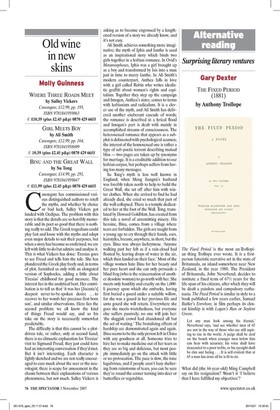Old wine in new skins
Molly Guinness WHERE THREE ROADS MEET by Salley Vickers Canongate, £12.99, pp. 195, ISBN 9781841959863 £1039 (plus £2.45 p&p) 0870 429 6655 GIRL MEETS BOY by Ali Smith Canongate, £12.99, pp. 164, ISBN 9781841958699 © 1039 (plus £2.45 p&p) 0870 429 6655 BINU AND THE GREAT WALL by Su Tong Canongate, £14.99, pp. 291, ISBN 9781841959047 £11.99 (plus £2.45 p&p) 0870 429 6655 Canongate has commissioned various distinguished authors to retell the myths, and whether by choice or bad luck, Salley Vickers got landed with Oedipus. The problem with this story is that the details are so horribly memorable and its poet so good that there is nothing really to add. The Greek tragedians could play fast and loose with the myths and adapt even major details to suit their purposes, but when a story has become so enshrined, we are left with little to do but admire and analyse it. This is what Vickers has done: Tiresias goes to see Freud and tells him the tale. She has plundered the Greek play freely and, in terms of plot, furnished us only with an elongated version of Sophocles, adding a little about Tiresias' childhood for good measure. The interest lies in the analytical bent. Her contribution is to tell us that 'it was her [Jocasta's] deepest never-to-be-spoken desire ... to recover to her womb her precious first-born son', and similar observations. Here lies the second problem: we all know the kind of things Freud would say, and so his take on the story is necessarily somewhat predictable.
The difficulty is that this cannot be a plotdriven tale, or rather, only at second hand; there is no climactic explanation for Tiresias' visit to Sigmund Freud; they just could have had an interesting conversation if they'd met. But it isn't interesting. Each character is lightly sketched and we are not really encouraged to care much about the seer or the neurologist; there is scope for amusement in the chasm between their explanations of various phenomena, but not much. Salley Vickers is asking us to become engrossed by a lengthened version of a story we already know, and it's not easy.
Ali Smith achieves something more imaginative; the myth of Iphis and Ianthe is used as an inspirational story which binds two girls together in a lesbian romance. In Ovid's Metamorphoses, Iphis was a girl brought up as a boy and transformed by Isis into a man just in time to marry Ianthe. In Ali Smith's modern counterpart, Anthea falls in love with a girl called Robin who writes idealistic graffiti about women's rights and capitalism. Together they step up the campaign and Imogen, Anthea's sister, comes to terms with lesbianism and radicalism. It is a clever use of the myth, and Ali Smith has delivered another exuberant cascade of words; the romance is described in a lyrical flood and Imogen's part is dealt with mainly in accomplished streams of consciousness. The heterosexual romance that appears as a subplot is delineated with psychological acumen; the interest of the homosexual one is rather a type of sub-poetic torrent describing mutual bliss — two pages are taken up by synonyms for marriage. It is a creditable addition to our lesbian corpus, but perhaps suffers from having too many messages.
Su Tong's myth is less well known in England; when Meng Jiangnit's husband was forcibly taken north to help to build the Great Wall, she set off after him with winter clothes. When she arrived to find he had already died, she cried so much that part of the wall collapsed. There is a temple dedicated to her at the foot of the Wall. Tong, translated by Howard Goldblatt, has created from this tale a novel of unremitting misery. His heroine, Binu, comes from a village where tears are forbidden. The girls are taught from a young age to cry through their hands, ears, hairstyles, breasts; anywhere, in short, but the eyes. Binu was always lachrymose. 'Anyone walking past her felt as if a rain-cloud had floated by, leaving drops of water in the air, which then landed on their face.' Most of the village women hate Binu for her beauty and her pure heart and she can only persuade a blind frog (who is the reincarnation of another desolate woman) to go north with her. She meets only hostility and cruelty on the 1,000ii journey upon which she embarks, having first buried a gourd under a suitable willow, for she was a gourd in her previous life and unto gourd she will return. Everywhere she goes she meets wretchedness, but everyone else suffers passively; no one will join her: `the sluggish crowd had abandoned all but the act of waiting.' The brutalising effects of hardship are demonstrated again and again. Binu seems to be the only person left in China with any goodness at all. Someone tries to hire her to make medicine out of her tears as they are so big and delicious, but most people immediately go on the attack with little or no provocation. The pace is slow, the tone lugubrious, and if people aren't busy sheltering from rainstorms of tears, you can be sure they're round the corner turning into deer or butterflies or vegetables.












































































 Previous page
Previous page